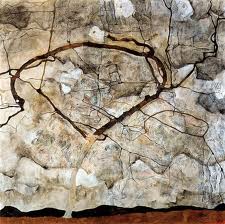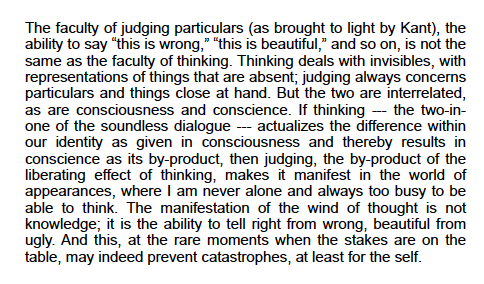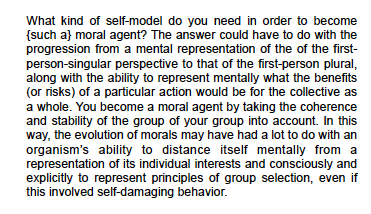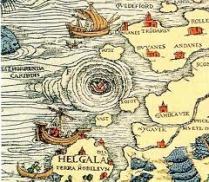We have been keeping a wary eye on affairs in Old Europe, wondering how so many cultures with many hundreds of years of divergent history can possibly be reconciled. Thus you can imagine our excitement when we stumbled across an online white paper written by a distinguished political philosopher of our own invention who presently teaches at the University of Bielefeld: Professor Wolfgang Keinengels.
Keinengels has been scratching his head over various thorny issues of European history for two decades, and now believes he may have found a solution to the problem of profoundly unbalanced accounts throughout the Eurozone. We spoke in German with Professor Keinengels last week, and offer the below edited and abbreviated transcript {reviewed and approved by WK} to our loyal readers, hoping to convey the gist of his radical and far from modest proposal:
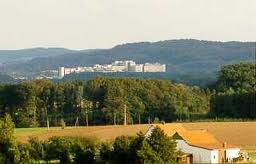
HEAVY DIRT-DENKEN AT BIELEFELD
DP You write that Europe has an intractable problem of history, that in your view history and its residues in daily consciousness within the life-world {Lebenswelt} constitutes the critical ontological problem in Europe; the “core account” that must be reconciled before the crisis can be resolved.
WK Yes, and of course it seems so obvious when you say it just like that in one sentence, but I wanted to see what would happen if we really pursued the idea, dug into it if you like: French dirt, German dirt, Greek dirt and so forth. It began as a kind of thought experiment, but sometimes you begin something like this, dirt digging, and then you finally hit something solid, I mean, not just the bones of some ancient conflict, but solid gold so to say, an idea whose time in the sun might finally have arrived.
DP And that is what you mean by the “rebalancing of variable dirt”?
WK Exactly. You see, the core problem of Europe is that our dirt — not our soil but our dirt — is so profoundly different, that is to say, the lived experience among bodies in relation to the demands of nature and landscape have taken quite markedly distinct forms and shapes and rhythms depending on where you performed the entire range of bodily functions; in that sense, there is no Europe, there has never been a Europe; there are instead these different “residues of life-world experience” that derive from dramatically distinct experiences, and these residues yield different qualities of dirt and become, if you will, part of the national treasure or inheritance, that is, not what comes out of the dirt, but the dirt itself {Schmutz-an-sich}, which is the symbol of the shared experience of the collective corporeal identity that always must take grounded earth as its essential existential property.
DP We were particularly struck by your thoughts on how consciousness relates to these different existential dirt balances {existentielle Schmutzguthabens}, as your call them.
WK Yes, based on contemporary advances in neurobiology, some of them happening right here at the University of Bielefeld, we propose that the ground upon which we walk does significantly shape and impact our moment to moment consciousness of self, above all self in relation to the social-political group, and thus it is not realistic to expect that consensual decision making will emerge from such radically unreconciled dreck accounts, or Schmutzguthabens.
DP We suppose that what some may have found controversial in your analysis is your idea of a trans-European market for these Schmutzguthabens.
WK Yes, at first we simply wanted to see where the thought process would lead, but as we got deeper, we realized that we may have uncovered a fresh approach with massive policy implications. It is true that different dirts have different values, and that in part depends on the depth of the smut, and the deepness of the history, but in theory we can imagine a certain “charge” or “value injection” that is stored in these different dirt balances, charges that will have an impact on day to day consciousness in the Lebenswelt.
DP How does that work?
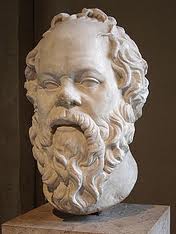
HIS DIRT HAS VALUE
WK For example, we Germans sometimes look at the average Greek citizen and wonder how he can still be so happy, with all the problems in Greece; he is still happy and smiling. That happy consciousness is based in the very particular granularity of the Greek storehouse of Schmutzguthaben, and the residual effect of that charge on everyday life, in private consciousness.
DP Emotions grounded in historical experience, stored in the core account …
WK Yes, exactly, I mean the happy Greek is deeply happy, irregardless of the present temporary despair; and it all comes through the feet, through which the Greek person knows, at a subliminal prelinguistic level, that in ancient times this was a well functioning and enlightened society, indeed the birthplace of so much culture, art; the polis and philosophy. Meanwhile at the same time in ancient Germania, we were basically animals, rutting and squatting in the dark wood.
DP So in essence, you’re talking about cutting a deal, dreck for dreck, so as to secure a piece of the Greek core account, and thus incorporate the happy Greek Lebenswelt?
WK No, I doubt there would be any takers for a straight trade, given the heaviness of German dreck, not just in ancient times, but also very conspicuously in more recent history – the really nasty Geschichtliche Scheisse that feeds what you might call the great German Kopfschmertz. But what we do have is something missing in the Greek situation, and that is economic prosperity; so the idea is that Germany would agree to assume the economic debts of Greece in exchange for Greece assuming part of the headache stored inside the German Schmutzguthaben.

A FEW SORE POINTS
DP So you mean to turn historical guilt for the Nazizeit into a sort of toxic waste, dumped on the Greeks?
WK No, I reject that sort of characterization, though you are not the first to use it. Our belief is that this core account rebalancing would lead to a certain evening out of the respective situations, as Greece would receive a nice welcome injection of German prosperity, and Germany would receive a nice injection of the Greek happy consciousness. We fully understand that while German dirt would go to Greece, there is negative exchange value there – a net liability – and so the deal needs to be sweetened with other benefits, in the form of debt forgiveness and other economic compensations such as home appliances and luxury automobiles.
DP So in effect, Greece would be voluntarily accepting this dirt as the physical repository of historical guilt, in exchange for Bosch dishwashers?
WK Yes, but try to see the bright side. We doubt that Europe will find any way forward into the future unless we start sharing everything. Like in a marriage, you take the good with the bad. It is pointless to speak of a banking union, or a fiscal union, unless you have a union in consciousness, and this means also a dispersion of historical implications and consequences, if you will, such that we all walk on the same earth, and smell the same mud. Why should Germany not be able to have some small stake in the origins of western philosophy? This way, Nietzsche residues can intermingle in a very material way with particulates from Socrates and Plato; does this not have a certain ring of truth to it?
DP No comment on that one, for now; so how has all this been received?
WK Well, first there was shock. We anticipated that. First comes shock, and then comes reality. The hard fact is that there is not much else of value in Greece for Germany to receive from them in trade, beyond their valorized consciousness, as expressed and stored and sustained through Greek Schmutzguthabens, and we see this reality slowly but surely sinking in, with more and more people coming around to our way of thinking.
DP How so?
WK We have had plenty of offers to broker private placements at a family or community level; offers to receive a few tons of German dirt here and there. At a national level, it will likely take more time, but we’ll get there. The fundamental point is that there really can be no European future until these historical inequalities have been reconciled properly, through the marketplace.
DP What about the logistics of this plan? Is this not a massive undertaking, moving so much dirt from north to south and from south to north, across such challenging terrain?
WK Yes, and that is where the secondary benefits come in. As you know, there are very high unemployment levels in places like Spain and Italy. So those populations now receive immediate benefits of good jobs and new mechanical skills. Then maybe down the road we can arrange similar reconciliations with each of those countries, too. We have no illusions about the size and depth of the German Schmutz-Probleme. We are all too conscious of that — indeed we have a surplus of such heavy consciousness, which we now wish to trade for a happier, sunnier state of mind.
DP In other words, there is plenty of Kopfschmertz and Geschichtliche Scheisse to go around?
WK You might say that, yes, though putting it more positively you could also say there is plenty of good German prosperity to go around too. Let’s be fair about it and share everything, the good with the bad. Then we can start talking about a true European union.

HEADACHE TABLETS

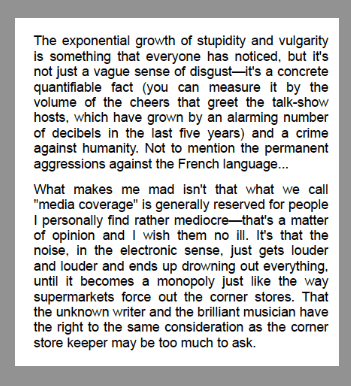











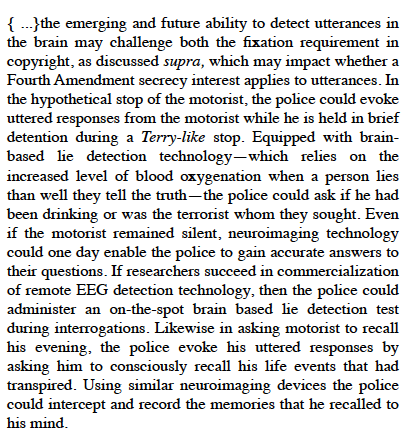




 If we take this latter statement to be valid, then does not such political autonomy include “the enjoyment of intellectual autonomy”? If so, then is there any ethical question whatsoever, in this consideration? Is not the boundary line abundantly clear, a line that must be vigorously defended, without compromise?
If we take this latter statement to be valid, then does not such political autonomy include “the enjoyment of intellectual autonomy”? If so, then is there any ethical question whatsoever, in this consideration? Is not the boundary line abundantly clear, a line that must be vigorously defended, without compromise?


 The objection that forensic neurotechnologies transform our own nervous systems into our own worst enemies would likely elicit this sort of reply:
The objection that forensic neurotechnologies transform our own nervous systems into our own worst enemies would likely elicit this sort of reply:



 Rilkean “growth” – the growth enabled by such recurrent decisive defeats – represents an expansion both of the quality of conscience, with regards to the silent dialogue with the self and of the quality of the judgement, which is the manifestation of the wind of thought within the world of appearances.
Rilkean “growth” – the growth enabled by such recurrent decisive defeats – represents an expansion both of the quality of conscience, with regards to the silent dialogue with the self and of the quality of the judgement, which is the manifestation of the wind of thought within the world of appearances.